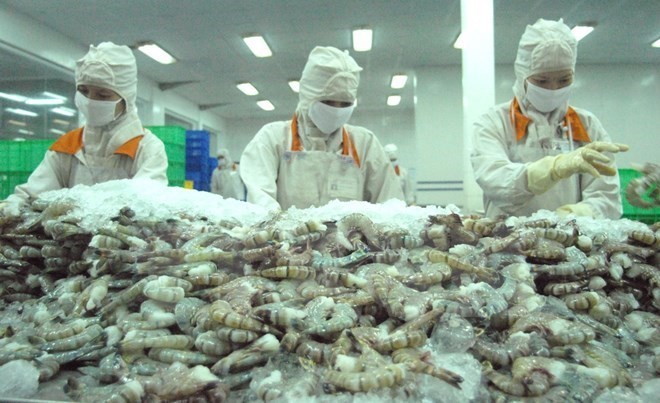- Giới thiệu
- Nhóm Công tác
- Tin tức
- Thông tin về FTA
- Tài Liệu
- Sự kiện
- Liên hệ
Standardize shrimp value chains to promote export
In order to reach the export targets of USD 10 billion by 2025, Viet Nam needs to form shrimp value chains from farming and processing to exporting and standardize these supply chains to meet international standards.

In January 2019, former US Secretary of State John Kerry had a working visit to Viet Nam. During this trip, Seafood Watch (SW) - a US non-governmental organization specialized in assessing the quality of imported seafood into the US market chose the Private Economic Development Research Board (Board No. IV under the Government’s Advisory Council for Administrative Procedure Reform) as a Vietnamese partner to advise the Government on the standards of commercial shrimp if it wants to enter the US market.
In order to find a sustainable development direction for Vietnamese shrimp, SW and Board No. IV have come up with a solution at workshop series on "Shrimp production value chain models meeting the US export standards" in February 2019 in Soc Trang, Tra Vinh and Ca Mau provinces.
The results of these workshops will be discussed at the constitutional session of the Vietnam Economic Forum before being reported to the Prime Minister at the plenary session, which is expected to take place in March 2019 in Hanoi.
Mr. Josh Madeira, Senior Manager of Ocean Conservation Policy at Seafood Watch informs that the US is a big shrimp importer, Viet Nam is one of the biggest exporters to the US market and Viet Nam also plans to expand shrimp exports in the US market. “The vision now is not to expand the farming area, but to increase the quality of shrimp products. To increase export value in the US market as well as other major markets, it is essential to understand the standards of these markets to establish production chains and increase the value of farmed shrimp” said Mr. Josh Madeira.
Currently, SW's partners are committed to increasing the procurement of environmentally sustainable products. According to SW statistics, 90% of the largest US retailers will only buy seafood from suppliers that ensure environmental sustainability, in Europe this rate is 75%. Retailers have their specific schedules. It is expected that in the next 2-3 years, demand for sustainable products will be very high and this demand will continue to increase.
SW alleged that, according to a survey among its partners, the reason of purchase on environmentally sustainable products was due to the end consumers’ expectation on the suppliers’ compliance with environmental standards. Accordingly SW developed criteria such as law, food, traceability, environmental protection, etc. to be adopted by shrimp producers.
ASIC standards for farms of SWs currently applied in Viet Nam include: Traceability; Shrimp health management; Aquatic resources/Seeds; Food sources and food management; Environmental impact management.
Currently, Board No. IV is proposing models based on SW standards. Soc Trang, Tra Vinh and Ca Mau provinces will pilot the selection of shrimp producers, food suppliers, infrastructure service providers, banks ... to form a closed chain according to the standard process. The first step will be to pilot on a model of 10-50 shrimp ponds/areas to ensure that the quality of Vietnamese commercial shrimp can gain a yellow card and green card into the US market.
Tin liên quan
PSAV Attends the 30th Anniversary Celebration of Cargill Vietnam2025/10/23
Plant health management helps increase coffee yield up to 15%2025/10/16
An Giang to host 2025 OCOP forum for sustainable development2025/09/25
Viet Nam and France foster cooperation on blue economy and sustainable environment2025/09/29
Agriculture and Environment exhibition ready for National celebration2025/08/27



 Điều lệ hoạt động
Điều lệ hoạt động



















































